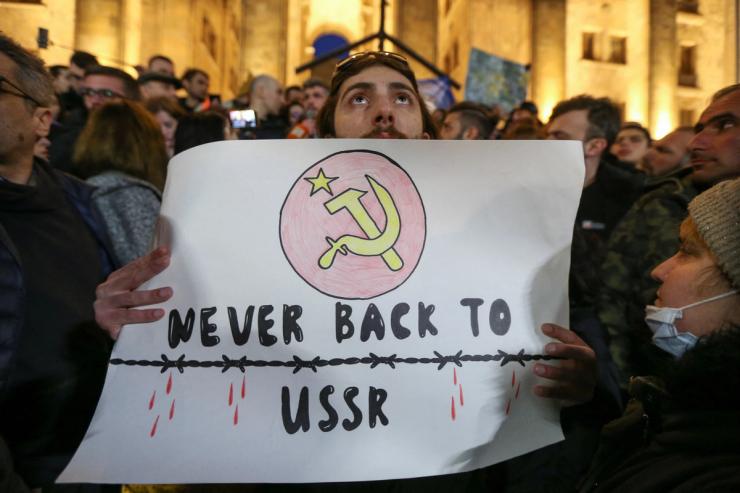The News
The ruling party in the country of Georgia announced Thursday that they are pulling a controversial “foreign agent” bill that critics said would have curtailed freedom of speech and impeded relations with the West.
The announcement followed two days of widespread protests against the bill that turned violent in the nation’s capital.
The Scene
Thousands of Georgians surrounded the country’s Parliament building in Tbilisi and clashed with police Wednesday.
Peaceful at first, the protests eventually became violent, with protesters tearing down barricades surrounding the Georgian Parliament and flinging fireworks at police. Authorities responded with water cannons, tear gas, and rubber bullets.
At least 66 people were arrested on Wednesday, and 50 police officers were injured, government officials said. While the number of injured protesters remains unclear, unverified videos appeared to show emergency rooms filled with wounded people.
Here’s a look at the bill in question, and why it got so much criticism from Georgians, human rights groups, and European leaders.
Know More
The law would have required any Georgian organization that receives more than 20% of its funding from abroad to register as a “foreign agent” and be subject to additional oversight and reporting requirements. Critics worried it could be used to crack down on press freedoms and NGOs that receive foreign backing.
The bill got an initial approval by Georgia’s parliament on Tuesday, and would have had to go through more readings before it becomes law.
The measure was backed by Prime Minister Irakli Garibashvili but opposed by President Salome Zourabichvili, who holds a largely ceremonial post and has said the law would bring Georgia closer to the “vicious model of Russia.”
The View From Russia
The Georgian bill mimicked many of the same components of a Russian law that was originally enacted in 2012 in response to protests against Vladimir Putin’s return to the presidency.
At the time, the law curtailed the power of many NGOs by mandating audits on organizations receiving international funding and broadening the criminal code for the recipients, essentially silencing any dissent from these groups. A total of 148 organizations were designated as “foreign agents” four years after the law was enacted, with 27 of these having to shut down, according to Amnesty International.
The law was expanded in 2017 to include media organizations, but the language was kept vague, meaning the Kremlin could label any media organization as a foreign agent.
Putin doubled down on the law in 2022 with new provisions dictating that any individual can be classified as a “foreign agent” if their activities “contradict the national interests of the Russian Federation.”
The View From Brussels
Several protesters outside the Georgian Parliament building held European Union flags.
That’s because opponents also feared the law could jeopardize Georgia’s chances for joining the EU. The country applied for candidate status shortly after Russia invaded Ukraine last year, though EU leaders have said Georgia needs to first make a number of legislative and political reforms.
European Council President Charles Michel said Wednesday that he was “strongly concerned” about what was happening in Georgia, and that the “adoption of this ‘foreign influence’ law is not compatible with the EU path” that the majority of Georgians want.
And EU foreign-policy chief Josep Borrell has said the proposal “goes against Georgia’s stated objective of joining the European Union.”

